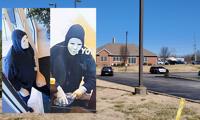The three men who killed , a 25-year-old jogger, are appealing their , with two of the three arguing the government did not prove they chased the young man
The men's attorneys, who filed the appeals earlier this month, all asked for an opportunity to present their case in court.
Travis McMichael, his father Gregory McMichael and their neighbor William "Roddie" Bryan were found in a Georgia court in 2021 and
In their federal trial that followed, of interference of rights, a federal hate crime, and attempted kidnapping, while the McMichaels were also each convicted on a weapons charge. The father and son and Bryan was sentenced to 35 years, to be served at the same time as his state sentence.
In their appeals, the elder McMichael and Bryan both challenge whether prosecutors proved the men acted the way they did "because of" Arbery's race and color. Travis McMichael's appeal instead focused on more technical matters to do with his convictions on attempted kidnapping and weapons use charges.
"The evidence against Bryan did not present a man who saw the world through a prism of racism. He was not obsessed with African Americans such as his codefendant Travis McMichael," Defense attorney J. Pete Theodocion, who filed an appeal on behalf of Bryan, wrote in the filing.
"There is simply not sufficient evidence in the record to suggest Bryan would have acted any differently on the day in question had Arbery been white, Hispanic, Asian or other," the attorney wrote. "Every crime committed against an African American is not a hate crime. Every crime committed against an African American by a man who has used racist language in the past is not a hate crime."
Arbery was while he was out on a jog -- something he was known to do, according to his loved ones -- in the Satilla Shores neighborhood, outside the city of Brunswick in south Georgia.
of the after it was released in May 2020, weeks before the police killing of that set off a summer of
The federal trial of the three men featured testimony from witnesses who spoke about racist messages the men used.
The remarks witnesses shared in court, which had been made privately and publicly, revealed the men talked about Black people in derogatory terms and used racial slurs in conversations with others -- key evidence prosecutors used to prove they acted out of racial animus.
Defense attorneys during the trial acknowledged their clients used racist language but denied that's what motivated their actions.
The-CNN-Wire
� & © 2023 Cable News Network, Inc., a Warner Bros. Discovery Company. All rights reserved.












